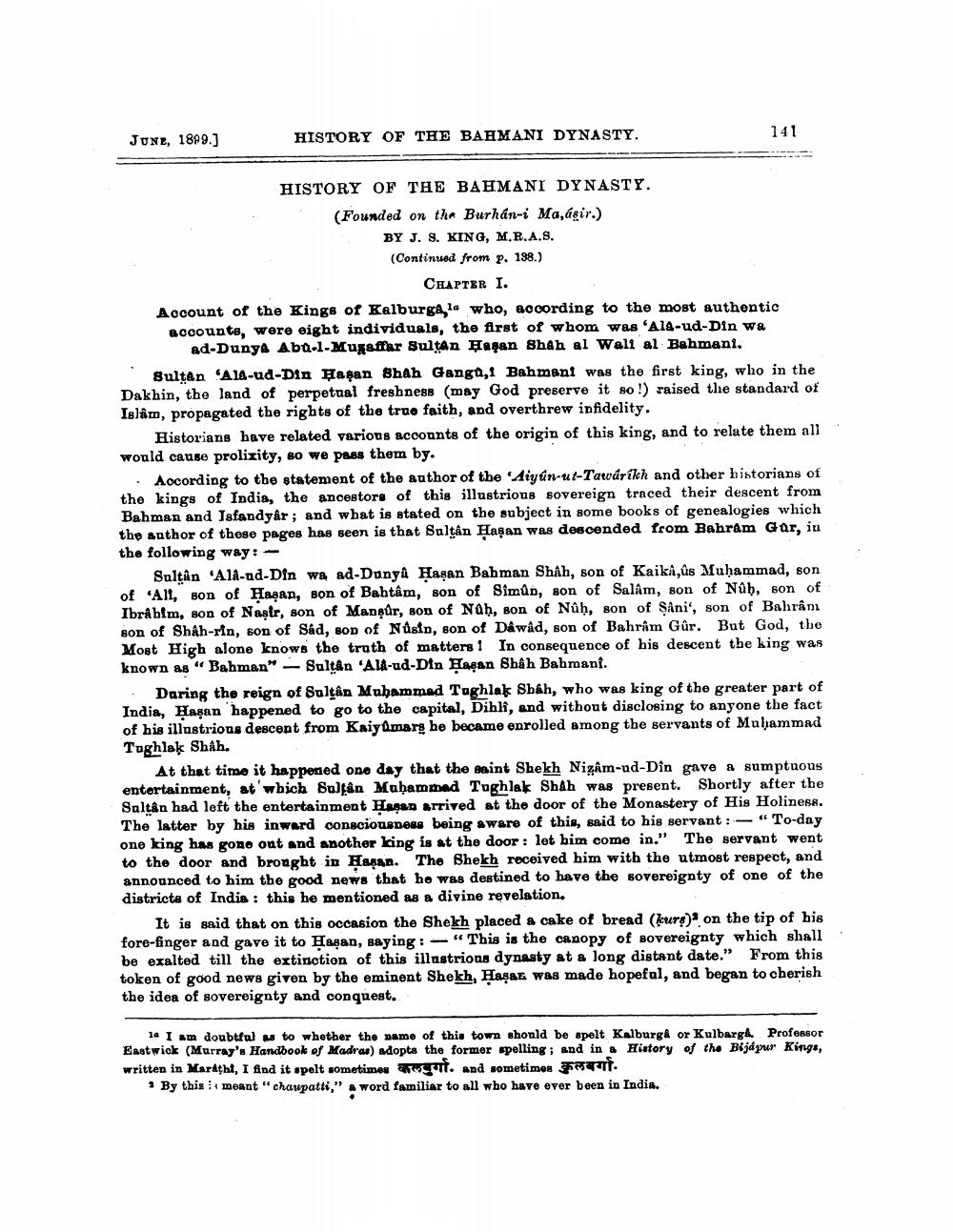________________
JUNE, 1899.)
HISTORY OF THE BAHMANI DYNASTY.
141
HISTORY OF THE BAHMANI DYNASTY. (Founded on the Burhan-i Ma,ásir.)
BY J. S. KING, M.R.A.S. (Continued from p. 188.)
CHAPTER I. Account of the Kings of Kalburg, le who, according to the most authentic Bccounts, were eight individuals, the first of whom was 'Ald-ud-Din wa
ad-Dunya Abu-l-Muxaftar Sultan Haşan Shah al Wall al Bahmani. Sultan 'Al-ud-Din aşan Shah Ganga, Bahmant was the first king, who in the Dakhin, the land of perpetual freshness (may God preserve it so!) raised the standard of Islâm, propagated the rights of the true faith, and overthrew infidelity.
Historians have related various accounts of the origin of this king, and to relate them all would cause prolixity, so we pass them by.
• According to the statement of the author of the 'Aiyun-ut-Tawáríkh and other historians of the kings of India, the ancestors of this illustrions sovereign traced their descent from Bahman and Jafandyar; and what is stated on the subject in some books of genealogies which the author of these pages has seen is that Sultan Hasan was descended from Bahram Gur, in the following way:
Sultan Ala-ud-Din wa ad-Dunya Haşan Bahman Shah, son of Kaika,ûs Muhammad, son of All, son of Hasan, son of Bahtâm, son of Simûn, son of Salam, son of Nûh, son of Ibrahim, son of Naşir, son of Manşür, son of Nah, son of Nûh, son of Sani', son of Bahrâm son of Shah-rin, son of Sád, son of Nůsin, son of Dawad, son of Bahram Gûr. But God, the Most High alone knows the truth of matters 1 In consequence of his descent the king was known as “Bahman" - Sultan 'All-ud-Din Hagan Shah Babmani.
Daring the reign of Sultan Muhammad Toghlak Shah, who was king of the greater part of India, Haşan happened to go to the capital, Dihli, and without disclosing to anyone the fact of his illustrious descent from Kaiyûmarg he became enrolled among the servants of Muhammad Toghlak Shah.
At that time it happened one day that the saint Shekh Nizâm-ud-Dîn gave & sumptuous entertainment, at which Bulan Muhammad Tughlak Shah was present. Shortly after the Sultan had left the entertainment Hanan arrived at the door of the Monastery of His Holiness. The latter by his inward consciousness being aware of this, said to his servant: -“To-day one king has gono out and another king is at the door: let him come in." The servant went to the door and bronght in Hasan. The Shekh received him with the utmost respect, and announced to him the good news that he was destined to have the sovereignty of one of the districts of India : this he mentioned as a divine revelation.
It is said that on this occasion the Shekh placed a cake of bread (kurg), on the tip of his fore-finger and gave it to Hagan, saying: -“This is the canopy of sovereignty which shall be exalted till the extinction of this illustrious dynasty at a long distant date." From this token of good news given by the eminent Shekh, Haşas was made hopeful, and began to cherish the idea of sovereignty and conquest.
18 I am doubtful - to whether the name of this town should be spelt Kalburgå or Kulbarga Professor Eastwick (Murray's Handbook of Madras) adopts the former spelling and in History of the Bijapur Kinge, written in Maratht, I find it spelt sometimes i t. and sometimes F TTT.
* By this meant "chaupatti," a word familiar to all who have ever been in India.




